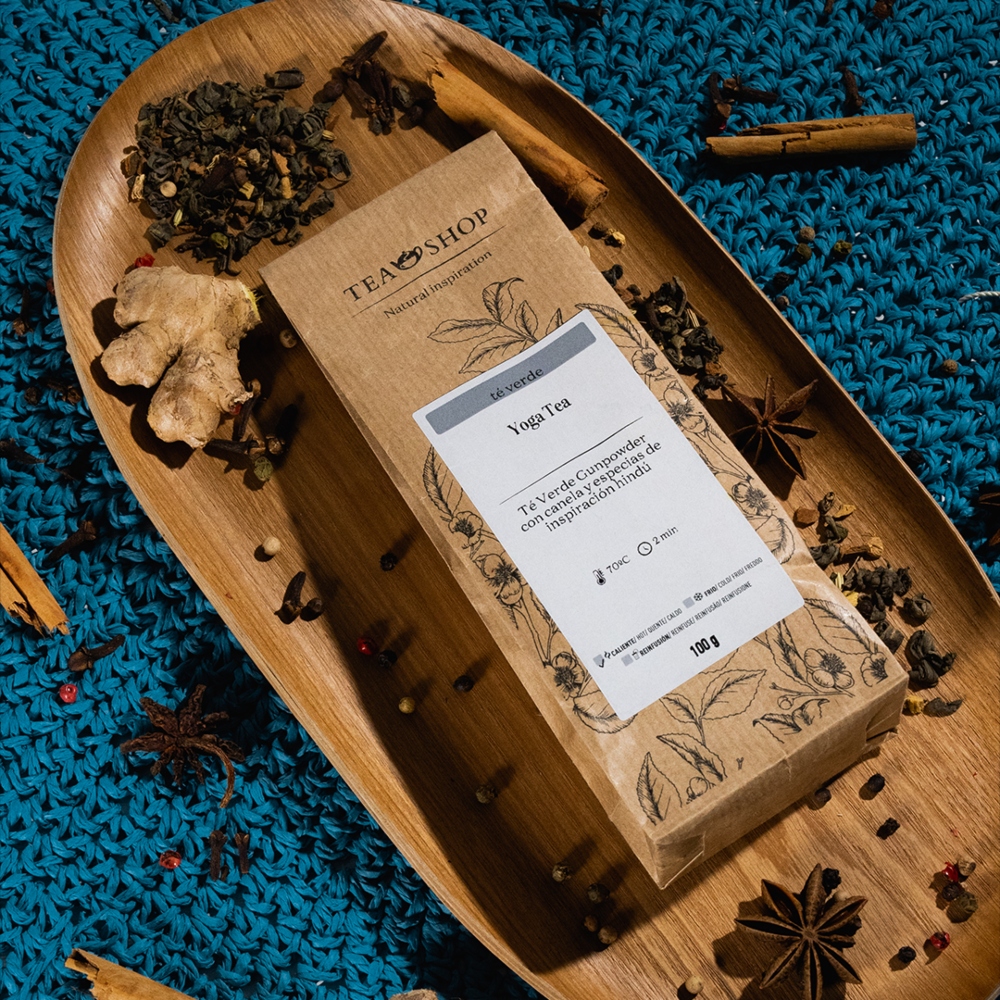cardamom properties: the secrets of a little-known spice
An essential spice in Indian cuisine, cardamom is arousing growing interest in the West, both for its taste qualities and its healing properties.
In gastronomy, cardamom is highly appreciated for its flavor reminiscent of lemon and pepper, but without being spicy. It is one of the star ingredients of the famous Indian spice blend, Garam Masala, the basis of tasty rice dishes, stews and meats found in Indian, Pakistani and other Southeast Asian countries.
It is also one of the elements that give chai tea its exquisite spicy aroma. Discover our selection of Chai Tea and Chai Latte!

Cardamom properties: What is cardamom
Cardamom is a perennial herb native to India and Sri Lanka. It belongs to the Zingiberaceae family, like ginger and turmeric. But unlike these, it is not the root that is consumed but its seeds.
Cardamom seeds are found in green pods, similar to pistachios in size, and can be consumed either crushed or as ground cardamom for seasoning both savory and sweet preparations.

If we leave aside its culinary use, what is cardamom used for? Much more than a tasty spice, cardamom as a medicinal plant has been used for millennia in India. Ayurvedic medicine already knew the therapeutic properties of cardamom to relieve many digestive (colic, diarrhea ...) and respiratory (asthma or bronchitis) discomforts, and to treat anorexia, anemia, asthenia and kidney stones.
It was also reputed to have stimulant and aphrodisiac properties, and was even used to relieve snake and scorpion bites. Cardamom could be considered an "all-round" medicine! Let's now see what diseases cardamom can help cure, and what ailments this versatile spice can prevent or alleviate.
Cardamom properties: cardamom health benefits
At a nutritional level, cardamom is rich in essential vitamins and minerals: magnesium, calcium, phosphorus, potassium, sodium and iron, as well as vitamins B2, B3 and vitamin C.
- The magnesium content in cardamom is particularly noteworthy. Magnesium is essential to maintain the normal functioning of muscles and nerves, to strengthen the immune system, to maintain a steady heartbeat and to strengthen bones. It also helps adjust blood glucose levels and is involved in the production of energy and protein.
- Calcium ensures strong and resistant bones and teeth, and is necessary in the body to help the contraction and relaxation of muscles and blood vessels.
- B vitamins help the body obtain energy from the food we eat and help form red blood cells.- As for vitamin C, it stands out for its antibacterial effect and its antioxidant power, essential to prevent cellular aging and contribute to the good health of the skin, bones and connective tissue. It also helps the body to absorb iron, especially iron of vegetable origin.
In addition to the benefits of cardamom derived from its minerals and vitamins, it is worth noting the importance of other extremely valuable components for health.
Cardamom has great therapeutic properties thanks to its two active principles: terpenic acetate with antispasmodic and tonic effects, and terpenic oxide with respiratory and anti-inflammatory properties.
- The first active principle of cardamom supports the treatment of numerous digestive disorders: indigestion, colic, gastritis, diarrhea, functional colopathy, digestive spasms.

- It also favors the elimination of accumulated gases in the stomach and facilitates intestinal transit. Hence the importance of cardamom-based herbal teas in herbal medicine. A digestive infusion of cardamom is one of the simplest remedies to effectively combat the annoying flatulence and pain they cause.
- To fight against heartburn after meals, it is recommended to sprinkle our dish with ground cardamom (if the flavor goes well with the food) or finish the meal with a cardamom infusion.
- The cardamom with its antispasmodic effect also favors the reduction of muscular pains and menstrual pains.
- It is also a psychic rebalancing, and good results have been observed in the treatment of mild depressive states in some patients.
- The respiratory and anti-inflammatory properties of the second active ingredient give cardamom the ability to alleviate respiratory tract diseases.
Colds are traditionally treated with cardamom in India. Cardamom is a natural expectorant that allows us to relieve coughs and fight bronchitis, asthma and tonsillitis, for example.
- Another remarkable property of cardamom is its analgesic power, particularly at the oral level. In Asia, cardamom is traditionally used to treat infections of the teeth and gums, thanks to its vitamin B2 content.
- It is good to know, although it is not a medicinal property per se, that chewing cardamom seeds is a very effective remedy to eliminate the taste of garlic in case of difficult digestion. Let's take note!
BUY TEA ONLINE AT TEA SHOP
At Tea Shop you will find a wide variety of bulk teas with which you can discover an endless number of flavors. Tea leaves are picked and processed in an artisanal way so as not to lose any of their aroma or properties, discover the benefits of bulk tea at Tea Shop's online store!
8 comments
Buenas tardes. Quisiera saber donde puedo comprar y precio del te de cardamomo y naranja. Gracias
Hilda Fernandez
Favor de enviarme precio de Cardamomo, y cómo puedo hacer pedido
Rosy Olvera
Hay te envío información importante !!!
Agustin Castro Cordova
Gracias que Dios bendiga siempre sus vidas 💛 ❤️ ♥️ 🙏 💕 💖 gracias por todo la información es muy buena
Ofelia
Muchas gracias por la información mil bendiciones
Andelfo Soto
Deseo comprar te de cardomomo
Mercedes Castro
La información es muy completa, muy bien textualizada, un producto con excelentes propiedades
Luis Emilio Perea Sanchez
Probare el te de cardamomo porque suelo tener inflamación x gases. Geacias x los consejos.
Alba Lopez
Leave a comment
This site is protected by hCaptcha and the hCaptcha Privacy Policy and Terms of Service apply.